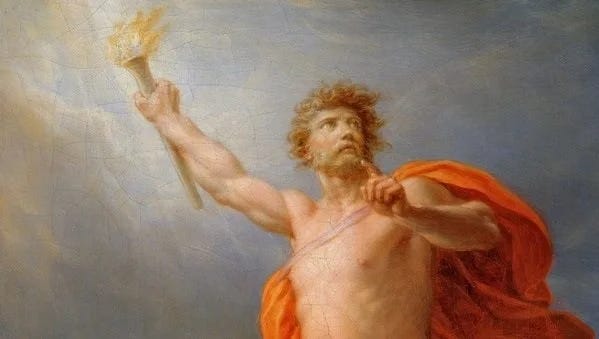Hey guys.
This is another demo of one of my original songs that is a long time in the making and (as is usually the case with my songs) has a long and convoluted origin story behind it. I’ll try to keep the nerdy music theory stuff out of this accompaniment essay until the end as I don’t want to get too bogged down in the jargon.
The song is called ‘Let It Burn’; a title it has bore since very early on in its life and has never changed since. I first had the inspiration for this song sometime during the latter part of my third year studying music at university.
I was hanging out with a few classmates when one of them, a woman roughly 20 years of age, was talking about her Imposter Syndrome. ‘Impostor Syndrome’ is a colloquial term for the anxiety and self-doubt felt by artistic and creative types who are questioning their own accomplishments and fear being exposed as a ‘fraud’. I experienced this quite a bit during my time at Uni because I was surrounded by so many incredibly talented musicians daily and had the privilege of using high end equipment/facilities everyday. I always felt like I wasn’t worthy of it, like I didn’t deserve it.
So we were all starting work on planning our performances for our grand finale module and feeling appropriately apprehensive about the whole thing. Like me, this girl’s main musical discipline was Songwriting and we were formulating song and stagecraft ideas for our respective performances. At some point, she said something akin to ‘I just cannot write any good songs. I just don’t have that ability.’
The usual and obligatory ego-boosting affirmations were offered to her in response to this statement by myself and others and the conversation moved on to whatever. But it stuck with me, the way she had said it.
To me, it seemed like she was not only palpably constrained by her self doubt, but also by her own fear. Fear of what? Probably failure, if I had to guess, as it is another common flaw in artistic minds that I know all too well. If you never try, you never see yourself fail, right?
It was like she was being held back by an unwillingness to commit fully. But underneath that fear I sensed an unmistakable tone of defiance in her voice. Deep down, I think she knew she did have the ability that she was doubting, the capability to write good songs.
It reminded me of the Ancient Greek myth of the Titan Prometheus [above], who stole fire from the Gods on Mount Olympus and gifted it to mankind who in turn used it to advance human civilization. For this transgression he was punished by Zeus, who chained Prometheus to a rock where an eagle would arrive every day to feast on his liver which would grow back every night so the torture could resume indefinitely.
‘Fire’ in this myth is often interpreted as an allegory for knowledge, but also the spirit of creativity. I like this metaphor a lot, the idea of a fire that represents human creativity deep within ourselves that can be suppressed but never extinguished. An ‘Eternal Flame’; a defiance of the heart.
I knew it wasn’t a particularly original metaphorical construct to build a piece of art around, but it felt compelling enough to inspire me to start work on this song.
I had been messing around with a few new guitar chords I had recently learned that week and ended up writing the riff that the intro and verse is built upon. I hadn’t thought about lyrics or top-line melodies at that point so I decided to map the song around the ‘Promethean Fire’ metaphor.
I struggled with writing lyrics for this song that I was happy with for ages because I never felt that the words I wrote were ever worthy of the riff that I was so proud of. I ended up changing the metaphor into something else entirely for my final performance and sang a completely different version of this song on that day. That version used fire as a metaphor for the human animal’s innate bloodlust, tribalism and capacity for violence inspired by the various sovereign conflicts happening in the world right now. It wasn’t as good or as poignant as I had hoped and I was deeply disappointed with it as a song.
But I still liked the riff and the vocal melodies I had written so I decided to rewrite it again after graduation, this time in keeping with my original vision for it: Fire as a metaphor for a suppressed yet unquenchable human spirit of creativity.
I researched how the fire metaphor had been used previously in art in search of inspiration that could inform my lyric writing. I refamiliarized myself with the Myth of Prometheus (of course). I discovered that Ray Bradbury’s novel Fahrenheit 451 used similar themes of ‘fire’ and the suppression of human spirit and checked it out. I read several great works by Walt Whitman that I can’t believe I ever lived without. All of these and many more works of art played a role in inspiring this song’s creation.
It took a while for all that stuff to percolate in my mind before I could start rewriting the song. And when I did start, I still found that I was unsatisfied with anything that I wrote. I ended up writing more drafts for this song than every other song I’ve written in my life combined. I have a folder named ‘Let it Burn’ on my Google drive that has a combined word count of over 50,000, consisting of notes and song drafts.
I ended up quoting or referencing the Myth Of Prometheus directly in the lyrics several times, (‘Defiance in the heart’, ‘Timeless gods’, ‘fire stolen long ago’, etc) because the words worked so well. I also subtly hint at a few lines of Whitman poetry at least once.
The song had briefly evolved into a song about ‘cancel culture’ for a time, where self-censorship and the threat of reputation damage became the oppressive force that forces the ‘fire of creativity’ underground. These versions were inspired in part by Fahrenheit 451 but more so by George Orwell’s classic dystopian novel and critique of authoritarianism, 1984. I eventually pivoted away from this framework but did end up keeping some of the lyrics from these versions because they still applied to the idea of a writer whose creative spirit is being suppressed. In fact, most of the lyrics in verses 3 and 4 are from the final ‘cancel culture song’ draft, which was directly inspired by the early chapters of 1984 where Winston Smith writes his heretical thoughts in his secret journal.
I finally finished the lyrics a few months back and have been experimenting with recording and producing it at home ever since. My home recording, production and mixing is improving slowly but steadily as I incrementally learn through practice, song by song. I could get someone more skilled to do it for me, but I like the idea of being 100% self-sufficient so I am happy to play catch up with the technical side of music making for a bit. Will I ever be at a professional level as a music producer? Probably not, but that’s not the point. I want to do it my way and only my way. You suck until you don’t, just gotta keep working until you get there.
Now for the nerdy music theory stuff.
The new chord that I had learned and ended up using in this song is a C (add9, add#11), a variation of an extended open C chord with an added F#, a note which is no closer than a Tritone away from the root note of C. Tritones are the most dissonant sounding intervals and are thus typically only rarely used in contemporary western music. But I loved sonic character of the riff when I resolved the phrase on this chord and I felt it somehow innately fit the thematic narrative I was trying to tell. I ended up transposing the entire song up by 3 tones (from Em to Bbm as heard in the demo) so this chord is now an F# (add9, add#11) with a tritone note of C.
In the early days of choral church music, the Tritone became known as the ‘Devil’s Interval’ or ‘Tone’ (diabolus in musica) due to its dissonant, unsettling feel and has been colloquially connected to The Devil in musical folklore since the Renaissance. This fact, coupled with what I had learned in a songwriting lecture about ‘Word Painting’ (Google it), prompted me to write the lyric ‘Angel’s song in the Devil’s Tone’ with the syllable ‘tone’ landing on the change to the chord that uses the devilish Tritone. Sorry, I’m proud of that bit of word painting and felt the need to wax lyrical about it briefly.
That’s ‘Let It Burn’. I hope you like it. Thanks for listening & please hit Subscribe if you’d like to hear more. Paid Subscribers get full access to my entire back catalogue of creative works, including my music, for just £3.50 per month.
Pete Brennan (aka The Common Centrist) Songwriter, Essayist & Imposter.
Lyrics
‘Life Goes On’... So the story goes
Timeless Gods… No-one ever knows
And the fire… Was stolen long ago
You hide… And bury far below
Angels song… In the Devil’s Tone
Lonely road… Taken all alone
And you write … Your secrets in the dark
And bite … your tongue and play a part
But no… more hiding who you are
And no… more whispers in the dark
Let it burn, Let it burn
And show us who you are
There’s a fire, in your soul so let it burn
Candlelight… In a hiding hole
Strangers write for a silent world
And keep, the fire in masquerade
And read…. the lies that keep it safe
Say the line and the fable’s told
Speak your mind, honey say no more
And you’ll know… Defiance in your heart
As it grows… Like fire in the dark












